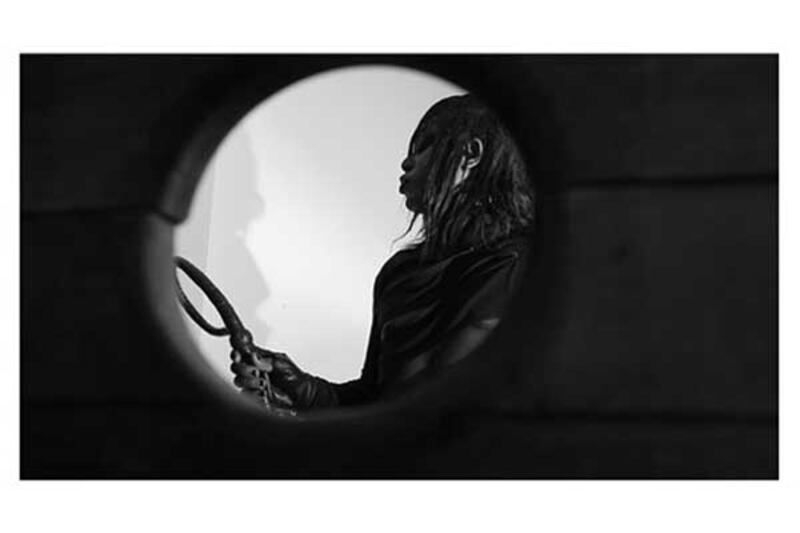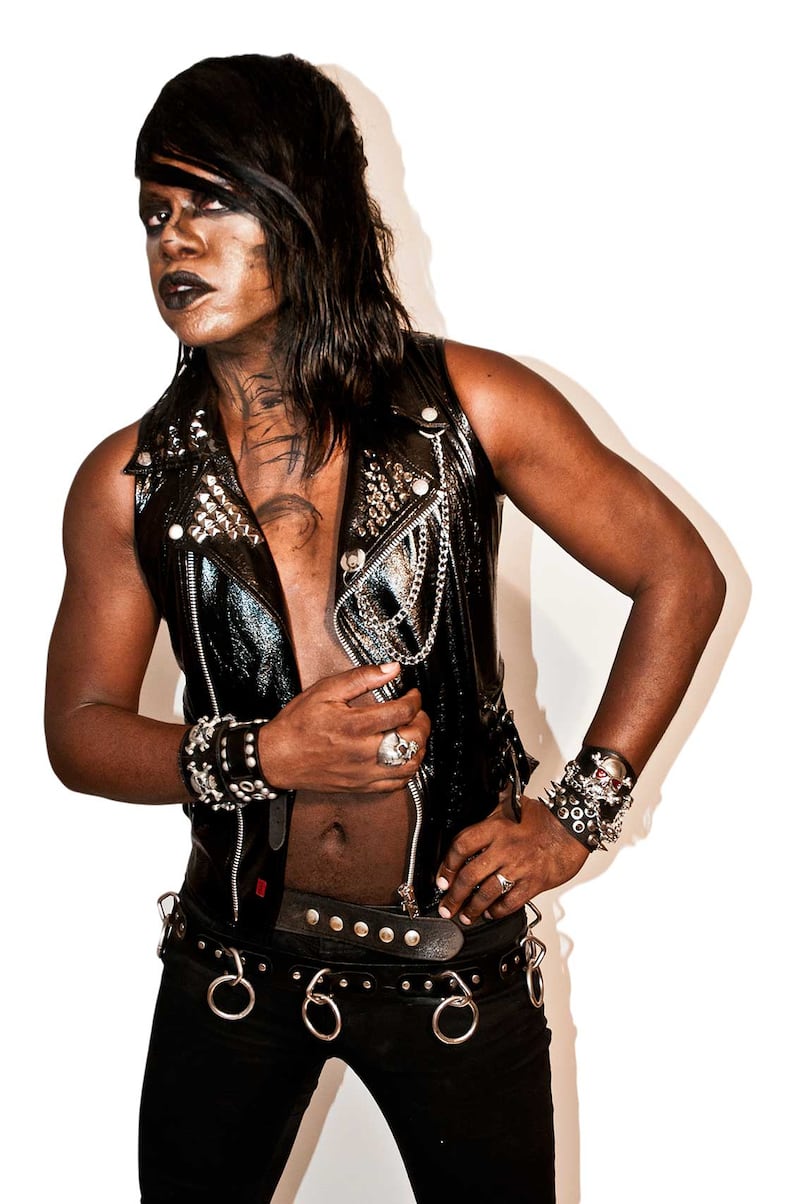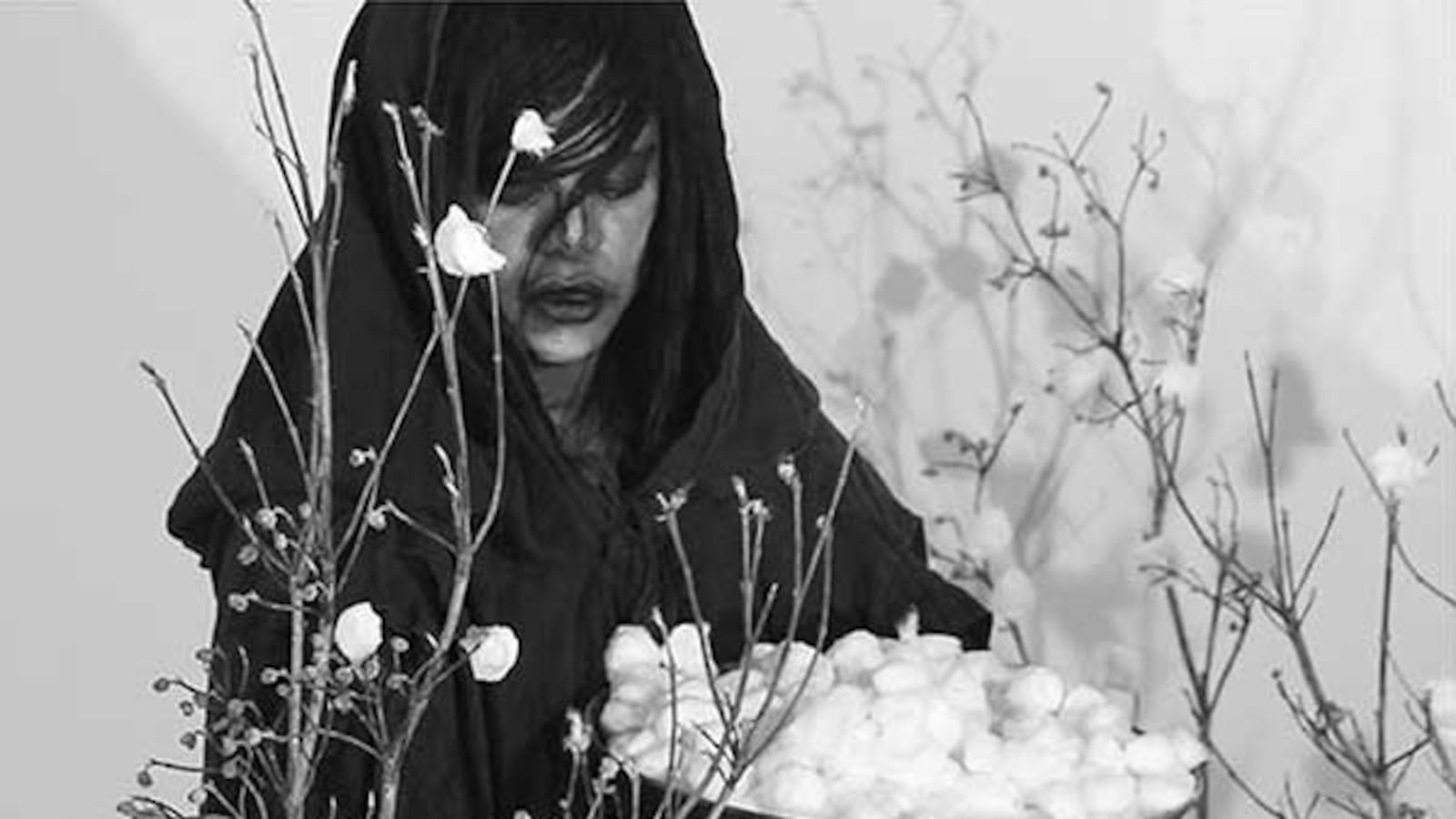M. Lamar, wearing black boots, black spandex, and a black leather jacket with liberal amounts of shiny metal studs, likened having his show, “Negrogothic,” at the San Francisco Art Institute (which he attended before going to Yale University to study sculpture and then dropping out to form a band) to having an ex come crawling back to you. He means that in a good way.
“I left the art world,” he says. “It’s like breaking up with someone who did you wrong and years later they come back begging for you to return—that’s what it’s like being back, and it’s exciting.”
Walking into “Negrogothic,” the first thing you see is a naked white man kneeling in a pillory, reading from Hegel’s Phenomenology of Spirit.
In the 10-minute black-and-white video, “Surveillance Punishment and the Black Psyche Part II,” with Lamar playing the Overseer, he has others read from Hegel, as well as the Cornel West Reader and Toni Morrison’s Beloved.

The sound on the film is Lamar, a counter tenor, singing in a style that combines his love of opera and metal. The exhibition, which also includes large-scale prints, explores the legacy of slavery and violence in America with images of Robert Mapplethorpe’s photography, lynching, and whips.
“‘Negrogothic’ is about horror and romance together,” Lamar says. “It’s the condition of black people in America.”
Lamar makes connections with the recent shootings of black males such as Tamir Rice and Michael Brown and his own work, saying the flip side of fearing black men is sexualizing them.
“He looks at many layers of the African American experience,” says the show’s curator, Hesse McGraw. “And he always takes you to the edge.”
M. Lamar, who several times mentions how San Francisco is so picturesque that you can almost forget about blizzards on the East Coast or genocide in other parts of the world, says he appreciates his time at SFAI.
It’s where he first saw a movie that means a lot to him—Looking for Langston, a black-and-white tribute to poet Langston Hughes, and where he first read feminist and activist bell hooks, who he now calls a mentor and friend (a few times he uses her term, “white supremacist capitalist patriarchy,” run together as one word).
And in Dewey Crumpler’s class on African American music, he saw a video of Marian Anderson singing “Amazing Grace” in what he calls a “game-over moment.” Another video Crumpler showed—of jazz musician Cecil Taylor—also had a profound effect on him.
“I was, you know, 18, 19, a child, and I had never seen a Negro like that,” Lamar said. “He sounded sort of like the opera singer Jessye Norman, and I was very familiar with her, that kind of grand majestic, regal blackness. Cecil said, ‘One can be walking on a summer’s day and you look up and see a fuchsia awning. That is music.’ And it just rocked me to my core because of the regality and the majesty. He was clearly a genius. I had never heard a note he played, but he was clearly brilliant, and I knew I wanted to be in some way to be like that.”
Many things he got out of the art school were pivotal to his work, Lamar says. But the main thing was to just keep working. And he’s done that, which he says he’s proudest of.
“You know that you’re probably going to have to have some horrible day job,” he said. “And then you go home and have to make your work. I think I was instilled with that here, and that’s a great gift.”

Lamar has a famous twin sister—the transgender actor Laverne Cox, who appears on Orange is the New Black. He played her character pre-surgery on the show. Lamar says he loves his sister very much—but he’s happy to have his own career.
“I’m so glad I’m not her because I’m not waiting around for mostly white people in a mainstream industry to write and imagine me,” he said. “Why I’m so happy I’m me and not her is that I have found a way to make my own work and cast myself in my own videos and to be the subject of the things I sing about in a complicated way, so I’m not relying on people who haven’t unlearned the imperialist white supremacist capitalist patriarchy to pay homage to me.”
Lamar says his sister’s fame shows how desperately people want to see representations of transgender people.
“I think that’s wonderful that a white woman decided to write a role for a black transperson–that’s great on a certain level,” he said. “My criticism is I think most representations of black women are just stereotypes and it reinforces my disinterest in representations of black people by white people. That doesn’t mean that white people shouldn’t try to do better, but I’m more interested in people representing themselves.”
Lamar describes himself as an underground artist–and says he needs to be a rebel to be free.
“One has to be pushing always, always, always against these systems,” he said. “I think there’s something besides all the critiques I have of the imperialist white supremacist capitalist patriarchy in my work. There is longing, there is love, there is desperation, and whenever someone is singing there is always hope.”






